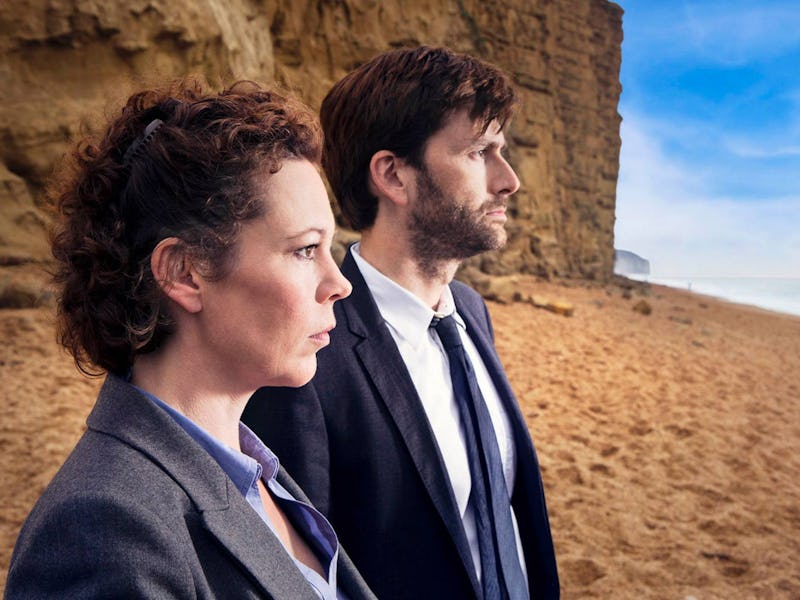Why Is Britain So Much Better at Police Dramas Than America?
Bones, Castle, NCIS, CSI, listen up: be more like The Fall, Broadchurch, and Luther.

As the fall TV season gets in full swing, and you’re looking for something to watch, you’ll inevitably notice a glut of police procedurals. Bones, Castle, CSI, Hawaii Five-0, The Mentalist, etc; All of these shows share the same recipes. Take charmingly conflicting personality types, add a dash of arguments, stir with sexual tension, and solve the crime just in time for the oven’s timer to ding. It makes for finished products that aren’t bad, but they hold a certain uniformity and predictability.
Britain, on the other hand, infuses their police dramas with their own energy. The Fall, Broadchurch, Luther — these shows don’t have inherently different ingredients from their American counterparts, but the way they mix them makes for more dynamic results. This is in part because they’re more diverse than American shows, which matters, but what matters more is how they navigate that diversity. Take Luther, for example.
Its formula is not original — world-weary detective with just the right amount of stubble solves crimes handsomely while running around gritty cityscapes — but how many American police procedurals have black heroes? Sure, Ice-T is on Law and Order, but it’s been around for a while in various incarnations with various heroes; it isn’t cemented in the cultural memory as his show. Luther belongs to no one but Idris Elba. So yes, that matters, but to assume it comes down to checking yes to box of “black hero” would be reductive. What matters more is that Luther, as a character, is a fully realized human being. As Viola Davis said in her Emmy acceptance speech, success can’t happen if the roles aren’t there.
In the same vein, The Fall puts a powerful woman at its center, which matters, but what matters more is how it treats her. Stella Gibson is more compelling than most of her American counterparts because she is allowed to be a fully realized person who is more than a Type; more than checking the “strong woman” box. She’s sexy without being a femme fatale and smart without being uptight or socially inept, like the heroine of Bones. The internet went crazy for this scene in particular because it handles her femininity in a way that doesn’t feel like her gender is her one defining trait. It’s significant yet remarkably low-key. It’s nonchalance suggests that all shows do this — and they should, but they don’t.
It isn’t just a matter of characters, either: The Fall puts a fresh spin on many such details. In American crime shows, we’re used to seeing establishing shots from the same series of city skylines: New York, Miami, L.A. But Belfast, with its rich and bloody history, makes for a fascinating setting, and yet shows set in Northern Ireland number in the single digits. The Fall does the same thing with themes and subtext: Between Dexter, Patrick Bateman, and Hannibal, “sexy serial killer” has become a trope — complete with a frisson of sexual tension between the hunter and the hunted — but writers typically leave it as an uneasy undercurrent. The Fall brings it out in fresh, provocative ways, like the back and forth bedroom scene that I’ll be annoyingly vague about because if you haven’t seen it, knowing it would ruin its chilling effect.
The Fall is also more subtle than your average grisly drama. The killer is terrifying not because he’s shown brutalizing women, but because he’s shown being tender with his dead victims. In our age of garish gore and more-is-more, its unexpected, infusing the attack scenes with a level of creepiness that paint-by-numbers violence would not otherwise convey.
British dramas explore different angles and showcase a variety of voices not to merely check off boxes — Strong Woman! Black Hero! Underused Setting!— but to build rich worlds that reflect our own world with better cinematography. Their characters are not Types but real, nuanced people. American crime dramas are too focused on boxes and Types. Nowhere is more apparent than in Broadchurch and its ill-fated American adaptation.
Broadchurch is a critically acclaimed British police drama about mismatched partners solving a murder in a small town. A simple premise, but the partners’ nonsexual dynamic and the use of townspeople as actual characters — not merely trotted out when they’re convenient to the plot — elevated it so much that American TV executives took note and made their own version called Gracepoint.
Gracepoint was a failure — critically panned and canceled. It imported Broadchurch’s characters and plot without its authenticity and spirit. In other words, it checked off the boxes that made it similar to Broadchurch but lost everything that made it special and original. Broadchurch worked? Great! Instead of striving for something fresh that emulates its spirit, let’s copy it!
British drama reaches beyond boxes and aims for the original as to where it’s become the norm. So American dramas, take note — next time you want to cover something in broad strokes, try, instead, honing in on the details. Maybe then the ingredients to a compelling show won’t be so lost in translation.